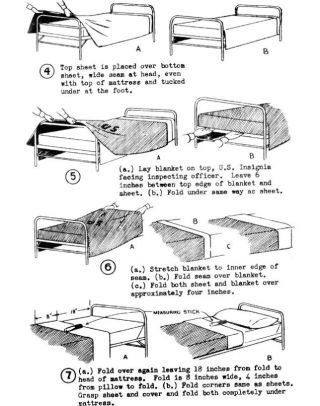To change your life in a big way, find some small wins.
Post published by Richard Smith Ph.D. on Jun 04, 2015 in Joy and Pain
Who among us has not vowed with absolute sincerity and conviction to
change a bad habit—only to fail miserably? I don't want to underestimate
the challenges of self-change, but here’s an idea: Start making your bed.
Successful major changes often result from taking small, repeated actions first.
 Sometimes we set our goals too high: We want to lose weight, and so we vow to cut out all desserts, completely. We want to get into shape, and so we plan on getting up at the crack of dawn every
day to go running. Maybe we are so disgusted with some aspect of
ourselves that we think this intense feeling will sustain such plans.
But for a multitude of reasons, we still fail. Our commitment vanishes
as if our emotionally-charged vows were mere puffs of hot air. With each
successive failure, whatever resolve we thought we had seems more
hollow. Soon, even our disgust with ourselves is disgusting.
Sometimes we set our goals too high: We want to lose weight, and so we vow to cut out all desserts, completely. We want to get into shape, and so we plan on getting up at the crack of dawn every
day to go running. Maybe we are so disgusted with some aspect of
ourselves that we think this intense feeling will sustain such plans.
But for a multitude of reasons, we still fail. Our commitment vanishes
as if our emotionally-charged vows were mere puffs of hot air. With each
successive failure, whatever resolve we thought we had seems more
hollow. Soon, even our disgust with ourselves is disgusting.
Small, consistent actions are more reliable. We have the ability and resources to complete and continue small actions. Any form of success, even if trifling and incremental, is important at first. Momentum builds on any success; nothing succeeds like success, and it feels great, too. Disgust and its memory soon dissipate, as these positive changes spill over into other domains needing and waiting for growth.
Starting small has a long history in different arenas; William James discussed it in his writing on habit (link is external). For an innovative contemporary take, I recommend Charles Duhigg's The Power of Habit. He cites evidence suggesting that the simple action of making one’s bed, when performed consistently, starts “a process that, over time, transforms everything” (Duhigg, 2012, p. 100). He calls such actions “keystone” actions.
A recent study by social psychologist Sung Hee Kim supports this idea. Kim advises undergraduate psychology majors at the University of Kentucky and has a keen interest in finding ways to help students follow good advice. To that end, she surveyed the various “micro” actions—those requiring little time, effort, or resources—that students engaged in which resulted in positive “macro” life changes.
Often, students recalled small actions, performed consistently, that they believed produced lasting, broader changes. The kind of micro actions ranged from getting up a bit earlier (10–20 minutes) in the morning and briefly reviewing course material, to writing down plans and assignments in a planner. Positive changes associated with getting up earlier, for example, included finding time to eat breakfast, reducing stress because of full class attendance, better grades, and enhanced self confidence.
On average, students reported that it took 21 days to notice such changes. Most students also reported that they had continued the action for an average of 9 months and believed the action was highly likely to continue. Although this study relied on self-reports, it provides thought-provoking material. These students’ small actions, requiring so little time and effort, seemed to foster good habits quickly and substantial self changes long-term.

Successful major changes often result from taking small, repeated actions first.

Source: http://lifehacker.com/the-proper-way-to-make-your-bed-the-navy-seal-way-1672236856#
Small, consistent actions are more reliable. We have the ability and resources to complete and continue small actions. Any form of success, even if trifling and incremental, is important at first. Momentum builds on any success; nothing succeeds like success, and it feels great, too. Disgust and its memory soon dissipate, as these positive changes spill over into other domains needing and waiting for growth.
Starting small has a long history in different arenas; William James discussed it in his writing on habit (link is external). For an innovative contemporary take, I recommend Charles Duhigg's The Power of Habit. He cites evidence suggesting that the simple action of making one’s bed, when performed consistently, starts “a process that, over time, transforms everything” (Duhigg, 2012, p. 100). He calls such actions “keystone” actions.
A recent study by social psychologist Sung Hee Kim supports this idea. Kim advises undergraduate psychology majors at the University of Kentucky and has a keen interest in finding ways to help students follow good advice. To that end, she surveyed the various “micro” actions—those requiring little time, effort, or resources—that students engaged in which resulted in positive “macro” life changes.
Often, students recalled small actions, performed consistently, that they believed produced lasting, broader changes. The kind of micro actions ranged from getting up a bit earlier (10–20 minutes) in the morning and briefly reviewing course material, to writing down plans and assignments in a planner. Positive changes associated with getting up earlier, for example, included finding time to eat breakfast, reducing stress because of full class attendance, better grades, and enhanced self confidence.
On average, students reported that it took 21 days to notice such changes. Most students also reported that they had continued the action for an average of 9 months and believed the action was highly likely to continue. Although this study relied on self-reports, it provides thought-provoking material. These students’ small actions, requiring so little time and effort, seemed to foster good habits quickly and substantial self changes long-term.

Source: lightwavemedia/Shutterstock
没有评论:
发表评论